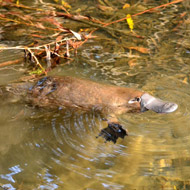
Scientists discover longer-lasting form of GLP-1 hormone
A powerful venom secreted by the platypus during breeding season could lead to new treatments for type 2 diabetes in humans, according to new research.
Scientists at the University of Adelaide and Flinders University were surprised to discover that the hormone produced in the gut of the platypus to regulate blood glucose, is also produced in its venom.
“This is an amazing example of how millions of years of evolution can shape molecules and optimise their function," said lead co-author Professor Frank Grutzner.
"These findings have the potential to inform diabetes treatment, one of our greatest health challenges, although exactly how we can convert this finding into a treatment will need to be the subject of future research."
The hormone, known as glucagon-likepeptide-1 (GLP-1), is secreted in the gut of both humans and animals. Its job is to stimulate the release of insulin to lower glucose in the blood, but GLP-1 typically degrades within minutes.
In people with type 2 diabetes, the short stimulus triggered by GLP-1 is not enough to maintain a proper balance of sugar. As such, a medication that includes a longer lasting form of the hormone is needed to help provide an extended release of insulin.
Reporting their findings in the journal Scientific Reports, the authors describe how the GLP-1 hormone in the platypus has evolved, making it resistant to the rapid degradation seen in humans.
"We've found that GLP-1 is degraded in monotremes by a completely different mechanism,” explained Professor Grutzner.
“Further analysis of the genetics of monotremes reveals that there seems to be a kind of molecular warfare going on between the function of GLP-1, which is produced in the gut but surprisingly also in their venom," he said.
During breeding season, the platypus produces a powerful venom which is used is competition among males for females.
The researchers discovered conflicting functions of GLP-1 in the platypus: in the gut as a regulator of blood glucose, and in venom to fend off other platypus males during breeding season.
“This tug of war between the different functions has resulted in dramatic changes in the GLP-1 system," said co-lead author Professor Briony Forbes.
"The function in venom has most likely triggered the evolution of a stable form of GLP-1 in monotremes. Excitingly, stable GLP-1 molecules are highly desirable as potential type 2 diabetes treatments.”
The team also discovered GLP-1 in the venom of echidnas, and are now looking for a way to convert their discovery into a possible treatment for type 2 diabetes.
Image (C) Klaus/Wikimeda Commons



 The veterinary mental health charity Vetlife is inviting the veterinary community to join it for a sponsored cold-water dip.
The veterinary mental health charity Vetlife is inviting the veterinary community to join it for a sponsored cold-water dip.